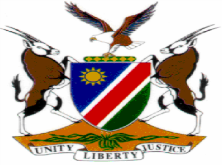NOT REPORTABLE
REPUBLIC OF NAMIBIA

HIGH COURT OF NAMIBIA NORTHERN LOCAL DIVISION, OSHAKATI
JUDGMENT
Case no: CR 5/2017
THE STATE
and
HAMWEENYE HAPPYSO HAFENI ACCUSED
(High Court Case no. 148/2017)
Neutral citation: The State v Hafeni (CR 5 /2017) [2017] NAHCNLD 50 (13 June 2017)
Coram: TOMMASI J et JANUARY J
Delivered: 13 June 2017
Flynote: Drug offences ― Statutory presumption that accused dealing ―Accused pleaded guilty but not admitting dealing ― Accused must be given opportunity to rebut presumption ― This cannot be done as part of questioning in terms of s 112(1)(b) of Criminal Procedure Act 51 of 1977.

ORDER

1. The conviction and sentence are set aside.
2. The case is remitted to the magistrate's court, Eenhana, in terms of s 312(1) of the Criminal Procedure Act, 51 of 1977, with the direction to act in terms of s 113 of the said Act.
___________________________________________________________________
JUDGMENT

TOMMASI J (JANUARY J CONCURRING)
[1] This case came before me on automatic review. The accused herein was convicted of having contravened s 2(a) of the Abuse of Dependence-Producing Substances and Rehabilitation Centres Act 41 of 1971, dealing in cannabis and sentenced to pay a fine of N$3000.00 or in default thereof 18 months imprisonment.
[2] The accused was sentenced on 13 December 2016 and the record of proceedings was received by this court on 14 May 2017.
[3] The accused was charged with having contravened s 2(a) read with, inter alia, s 10 of the Act. He was not charged with an alternative charge of having contravened s 2(b), possession of dependence-producing drug or plant. It was furthermore not stated in the particulars of the charge that it would be presumed that the accused has been dealing in view of the fact that the weight of the dagga exceeded 115 grams and neither was the accused alerted of this fact by the court.
[4] The accused pleaded guilty and was questioned in terms of s 112(1)(b). He admitted that he was in possession of 715 grams of cannabis and when asked what it was for, he answered that he smokes it and that he used to make tea with it.
[5] The leaned magistrate recorded that: ‘the court is satisfied that accused 1 has admitted to all the allegations in the charge and is now found guilty as charged (sic).’ The fact of the matter is that the accused did not admit that he was dealing with cannabis. The accused admitted to possession of cannabis.
[6] The question is whether the magistrate was entitled to convict the accused of dealing. Section10(1)(a) of the Act reads as follow:
‘If in any prosecution for an offence under section 2 it is proved that the accused was found in possession of-
dagga exceeding 115 grams in mass;
…
it shall be presumed that the accused dealt in such dagga or drugs, unless the contrary is proved.’
[7] In S v Kuvare 1992 NR 7 (HC) the court held that where an accused person is charged with dealing in dagga in contravention of s 2(a) of the Abuse of Dependence-producing Substances and Rehabilitation Centres Act 41 of 1971, it is unfair not to inform the accused in the particulars of the charge that he is presumed, in terms of s 10(1)(a)(i) of the Act, to have dealt in the dagga because he was in possession of more than 115 grams of dagga. In that case the accused pleaded not guilty and testified under oath. The court set aside the conviction and sentence as it held that the accused was prejudiced in his defence by the failure to inform him of the presumption and secondly because the court was of the view that, on the evidence, the presumption was rebutted.
[8] In S v Rooi 2007 (1) NR 282 (HC) the court held that before the prosecution or the court could rely on this presumption, it must remember that the presumption was rebuttable by proof to the contrary. The only way that the accused could present proof was by presenting evidence, which meant that he/she must be afforded the opportunity to do so under oath, either by giving evidence in person, or by calling witnesses. The prosecution must also be given the opportunity to cross-examine on the evidence presented by the accused. The accused could not attempt to rebut the presumption by means of answers during questioning in terms of s 112(1) (b) of the Criminal Procedure Act 51 of 1977.
[9] The magistrate, in view of the fact that the accused did not admit to dealing, ought to have recorded a plea in terms of s 113. The magistrate in the absence of an admission by the accused, could not have convicted the accused as the accused was not afforded the opportunity to rebut the presumption. The conviction therefore cannot stand and the matter should be remitted to the magistrate in terms of the provisions of s 312 of the Criminal Procedure Act, 51 of 1977 with the direction to act in terms of s 113 of the Criminal Procedure Act, 1977 (Act 51 of 1977).
[10] In the result the following order is made:
1. The conviction and sentence are set aside.
2. The case is remitted to the magistrate's court, Eenhana, in terms of s 312(1) of the Criminal Procedure Act, 51 of 1977, with the direction to act in terms of s 113 of the said Act.
___________________
MA TOMMASI J
Judge
___________________
HC JANUARY
Judge
3